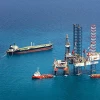71 careers found.
Electronics engineering technicians assist electronics engineers with research, design, manufacturing, operation and maintenance tasks. They may work under the direction of electronics engineers, technologists or associates in all stages of planning, design, maintenance and production.
Engineering managers plan, administer and review engineering and technical operations.
Fabrication engineering tradespersons cut, shape, join and finish metal to make, maintain or repair metal products and structures. They may produce moulds or patterns for metal castings, apply coatings and work with a variety of materials.
Mechanical engineering tradespersons carry out a range of mechanical work on machines, subassemblies and manufactured parts using a range of processes, tools and machines. Recent changes in the industry have resulted in a number of trade jobs being merged into broad occupational areas. The new training structure provides a mix of skills across a number of traditional occupations, while also allowing apprentices to develop specific skills.
Environmental engineers are concerned with assessing and managing the effects of human and other activity on the natural and built environment. They apply their engineering knowledge and skills to such things as environmental impact assessment, natural resources management and pollution control.
Geological engineers identify and try to solve problems involving soil, rock and groundwater, and design structures in and below the ground, using the principles of earth science. Geological engineering includes a number of ground engineering specialities such as geotechnical engineering, land remediation, rock mechanics, groundwater hydrology and engineering geology.
Industrial engineers plan, organise, supervise and manage the operations of industries to ensure the economical, safe and effective use of materials, energy and people.
Industrial engineering technologists study and try to improve the quality and quantity of goods produced, and the efficiency and economics of production.
Machine learning engineers play a crucial role in developing and implementing machine learning models and algorithms. They are responsible for collecting and preprocessing data, selecting appropriate algorithms and optimising model performance. Overall, machine learning engineers contribute to advancements in artificial intelligence and drive innovation in various industries.
Marine engineers control the installation, operation and maintenance of machinery and equipment on ships and vessels. Marine engineers work in the engine departments of cargo ships, dredges, offshore supply and drill vessels, floating production storage and offtake facilities, oil tankers, passenger ships and tugs. They need to be familiar with various types of diesel engines, steam plant and gas turbines.
Materials engineers investigate the properties of metals, ceramics, polymers, plastics and other materials, and develop and assess their commercial and engineering applications. Materials engineers may specialise in metals, ceramics, polymers, plastics or composites.
Mechanical engineers plan, design and oversee the development, installation, operation and maintenance of machinery. They conduct research to solve practical engineering problems and improve efficiency.
Mechanical engineering associates assist mechanical engineers and engineering technologists with the design, manufacture, construction, operation and maintenance of machines, manufacturing equipment, mechanical installations and mechanical facilities. They usually have a range of duties carried out under the direction of mechanical engineers and engineering technologists.
Mechanical engineering technicians carry out technical support functions as part of mechanical engineering research, design, manufacture, operations and maintenance. They may work under the direction of mechanical engineers, technologists and associates in all stages of planning, design, maintenance and production.
Mechanical engineering technologists design, inspect, manage and test technologies, systems and procedures in mining, manufacturing or processing industry plants.











